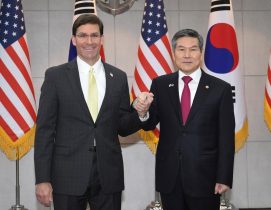
November 15, 2019
By Joyce Lee and Phil Stewart
SEOUL (Reuters) – U.S. Secretary of Defense Mark Esper pressed South Korea on Friday to pay more for the cost of stationing U.S. troops in the country and to maintain an intelligence-sharing pact with its other Asian ally Japan that Seoul is about to let lapse.
Speaking after a high-level defense policy meeting with his South Korean counterpart Jeong Kyeong-doo, Esper also said the two countries have to be flexible in modifying their joint military drills to support ongoing diplomatic efforts to end North Korea’s nuclear program.
South Korea “is a wealthy country and could and should pay more” for the deployment of U.S. military in the South, Esper told a briefing in Seoul after meeting Jeong.
Jeong said he and Esper shared the view that the cost-sharing pact now being negotiated should be fair and mutually agreeable, but it was unclear if they shared any sense of what a fair amount might be.
The United States and South Korea are scrambling to clinch an agreement in the coming weeks to cover next year’s costs of maintaining the 28,500-strong U.S. military presence in South Korea.
A South Korean lawmaker said last week that U.S. officials demanded up to $5 billion a year, more than five times what Seoul agreed to pay this year under a one-year deal.
U.S. President Donald Trump’s insistence Seoul take on a greater contribution as deterrence against North Korea has rattled South Korea. It could also set a precedent for upcoming U.S. negotiations on defense cost-sharing with other allies.
Jeong said he and Esper discussed personal views on South Korea’s decision to end an intelligence-sharing pact with Japan, called GSOMIA, and that both governments will put in realistic effort to narrow differences before the pact expires on November 23.
Relations between the two neighbors have plunged after South Korea’s top court last year ordered Japanese firms to compensate some wartime forced laborers, and Japan curbed exports of key industrial materials to South Korea in July.
(Reporting by Phil Stewart and Joyce Lee; Editing by Lincoln Feast.)



